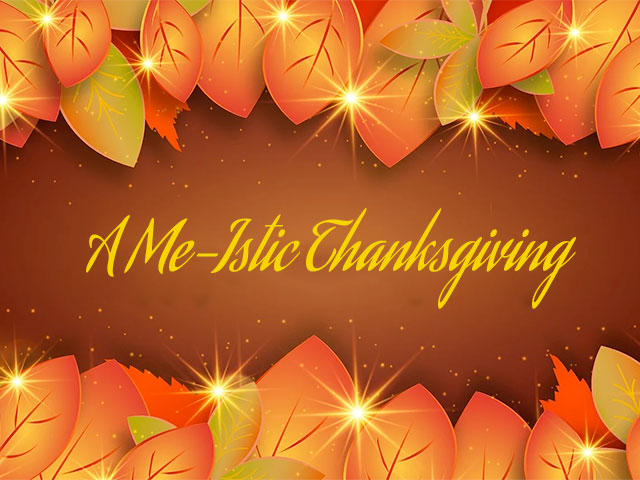A Me-Istic Thanksgiving
Tomorrow, in the United States of America, we celebrate Thanksgiving. I think a lot of countries have a holiday dedicated to gratitude, which is a good reminder to have on the yearly calendar, because I am convinced that the universal language of a fallen world is grumbling.
No matter who we are, where we live, and what is going on, we always seem to find a reason to grumble about something.
Complaint is more natural than gratitude; dissatisfaction more natural than contentment; want more natural than worship.
Numbering our complaints is easier than counting our blessings. Focusing on what we don’t have is easier than meditating on all that we have been given.
What about you? What has your last week “sounded” like? What have you been meditating on recently?
Because of God’s goodness and generosity, we have expansive reasons for praise. But if you’re anything like me, we find ourselves too often complaining.
Sin causes us to live for nothing more than ourselves. Sin makes self-satisfaction the highest human purpose. So, then, it makes sense that I would have a “me-istic” way of looking at, understanding, and experiencing everything. I evaluate everything in my life according to whether it is pleasurable or painful, and often in the immediate moment.
If you are in the center of your world, and if what is most important to you is what you want, what you think you need, and how you are feeling, then there will be no end to the things you find to complain about.
This “me-istic” way of living is never a recipe for happiness and contentment. It will always result in the pain of discontent, a life of disappointment, and a lifestyle of constant complaint.
In case you haven’t noticed, we live in a fallen world that doesn’t function as God originally intended. We are not sovereign, and the world will not do our bidding.
(Just as a reminder, God didn’t design life between the “already” and the “not yet” to be comfortable; he designed it to be transformational!)
The apostle Paul tells us in 2 Corinthians 5:15 that Jesus came so that those who live would no longer live for themselves. Jesus came to live a perfectly righteous life, to die an acceptable and substitutionary death, and to rise again, victorious over sin and death, so that we would be freed from our bondage to “me-ism.”
God is calling you away from an allegiance to your way to a joyful surrender to his way. God is taking you through things that you would have never chosen in order to produce in you sanctification that you could have never achieved on your own.
Tomorrow, on Thanksgiving, we need to remind ourselves of Romans 11:36: “For from him and through him and to him are all things. To him be glory forever. Amen.”
But we need this reminder more than just once a year. This is why I love and need Sunday worship. Although it can be painful and humbling, weekly gatherings are designed to confront us with the truth that serving ourselves is bondage, whereas serving him is where freedom can be found.
Church services put on display the centrality of God in all things. We need to be reminded once again that everything in life is about him, that every good gift comes from him, and that the amazing blessings he has lavished on us we could never have earned or deserved.
May Thanksgiving and the Sundays that follow fill our hearts to overflow with gratitude, so we become increasingly better at counting our blessings than numbering our complaints.
P.S. – this devotional is adapted from my new book, Sunday Matters: 52 Devotionals to Prepare Your Heart for Church. Each entry focuses on a Biblical truth, like having a spirit of gratitude or complaint, and prompts us to go to church for encouragement and exposure.
My prayer is that this book will help pastors, worship leaders, and congregants alike prepare for joyful, engaged, and passionate worship every week. Learn more about my newest devotional, out now, at PaulTripp.com/Sunday.
God bless,
Paul David Tripp
Reflection Questions
1. As you consider this last week, what have you “sounded” like in terms of complaints versus expressions of gratitude? Take some time to do a quick audit of how you communicate and examine what you’ve been meditating on recently. Has numbering your complaints been easier than focusing on all that you’ve been given by God? Why do you think a “me-istic” approach to life is so easy for you? Why might a “me-istic” approach to life be the most disappointing and miserable life to pursue?
2. If a self-centred, “me-istic” lifestyle always results in the pain of discontent, disappointment, and complaint, how then might that point you in a different direction? Why is “me-ism” really bondage, even though it feels like our default setting? Re-read 2 Corinthians 5:15 and write down a few specific ideas of how you might no longer live for yourself, but for Jesus who died for you.
3. Think through how God is calling you away from an allegiance to your own way and toward a joyful surrender to his way. Why does he want to take you through things you never would have chosen in order to produce in you the sanctification you never could have achieved on your own? Why is that difficult process of being sanctified a good thing even though it might be extremely painful? List the good things that can come as a result of that sanctification in your life.
4. As you meditate again on Romans 11:36, why do you think a posture of thanksgiving is something that will lead to true joy in your life? Why is Sunday worship a gift of God’s grace to act as a good reminder to live your life in a spirit of thanksgiving instead of complaint? How can weekly corporate worship steer your heart toward embracing the fact that everything in life is really about God and not about us?

